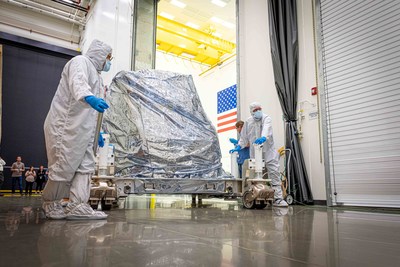Ball Aerospace Delivers Earth Science Instrument for Landsat 9
September 27, 2019
BOULDER, Colo., Sept. 27, 2019 /PRNewswire/ -- Ball Aerospace delivered the Operational Land Imager 2 (OLI-2) for Landsat 9, completing development of the instrument on schedule and under budget. Ball will continue to support instrument integration and spacecraft-level testing, working closely with NASA and the Landsat 9 spacecraft provider.

"Ball Aerospace is enabling the sustainability of the nation's land imaging architecture through collaboration with our customer and industry partners," said Makenzie Lystrup, vice president and general manager, Civil Space, Ball Aerospace. "By developing innovative, reliable, cost-effective instruments and investing in the next generation of land imaging technology, we are ensuring the long-term continuity of Landsat's important data record."
The Operational Land Imager 2 design is a virtual copy of the instrument's predecessor, which launched in 2013 on the Landsat 8 spacecraft and is operating past its design life with no interruptions to operations for more than six years. OLI-2 is a push-broom sensor with a four-mirror telescope that takes measurements in the visible, near infrared and shortwave infrared portions of the electromagnetic spectrum. The instrument images the entire globe every 16 days at resolutions as high as 15 meters, which is sufficient to resolve land cover features such as forests, farms and urban centers.
A partnership between NASA and the U.S. Geological Survey and industry, Landsat Earth-observing satellite missions have gathered multispectral imagery from space for more than 45 years, helping scientists understand the impacts of human activity and natural events on our planet through constant monitoring of land changes. Landsat 9 is the latest satellite in the Landsat series—it will continue Landsat's record-setting archive of Earth's land surface upon its 2020 launch.
OLI has demonstrated excellent calibration on orbit. To measure changes in Earth's surface over decades, Landsat instruments must be accurately calibrated to known independent standards. Landsat data is also the calibration standard for multiple other Earth observation missions, including commercial imagery constellations.
In addition to OLI-2, Ball developed the cryocooler for Landsat 9's Thermal Infrared Sensor 2 which measures surface temperature and tracks land and water usage. The flight cryocooler was delivered in February 2018.
Powered by endlessly curious people with an unwavering mission focus, Ball Aerospace pioneers discoveries that enable our customers to perform beyond expectation and protect what matters most. We create innovative space solutions, enable more accurate weather forecasts, drive insightful observations of our planet, deliver actionable data and intelligence, and ensure those who defend our freedom go forward bravely and return home safely. Go Beyond with Ball.® For more information, visit www.ball.com/aerospace or connect with us on Facebook or Twitter.
About Ball Corporation
Ball Corporation (NYSE:BLL) supplies innovative, sustainable aluminum packaging solutions for beverage, personal care and household products customers, as well as aerospace and other technologies and services primarily for the U.S. government. Ball Corporation and its subsidiaries employ 17,500 people worldwide and reported 2018 net sales of $11.6 billion. For more information, visit www.ball.com, or connect with us on Facebook or Twitter.
Forward-Looking Statements
This release contains "forward-looking" statements concerning future events and financial performance. Words such as "expects," "anticipates," "estimates," "believes," "targets," "likely," "positions" and similar expressions typically identify forward-looking statements, which are generally any statements other than statements of historical fact. Such statements are based on current expectations or views of the future and are subject to risks and uncertainties, which could cause actual results or events to differ materially from those expressed or implied. You should therefore not place undue reliance upon any forward-looking statements and any such statements should be read in conjunction with, and, qualified in their entirety by, the cautionary statements referenced below. The company undertakes no obligation to publicly update or revise any forward-looking statements, whether as a result of new information, future events or otherwise. Key factors, risks and uncertainties that could cause actual outcomes and results to be different are summarized in filings with the Securities and Exchange Commission, including Exhibit 99 in our Form 10-K, which are available on our website and at www.sec.gov. Additional factors that might affect: a) our packaging segments include product demand fluctuations; availability/cost of raw materials and logistics; competitive packaging, pricing and substitution; changes in climate and weather; footprint adjustments and other manufacturing changes, including the startup of new facilities and lines; failure to achieve synergies, productivity improvements or cost reductions; mandatory deposit or other restrictive packaging laws; customer and supplier consolidation, power and supply chain interruptions; potential delays and tariffs related to the U.K's departure from the EU; changes in major customer or supplier contracts or a loss of a major customer or supplier; political instability and sanctions; currency controls; changes in foreign exchange or tax rates; and tariffs, trade actions, or other governmental actions in any country affecting goods produced by us or in our supply chain, including imported raw materials, such as pursuant to section 232 of the U.S. Trade Expansion Act of 1962; b) our aerospace segment include funding, authorization, availability and returns of government and commercial contracts; and delays, extensions and technical uncertainties affecting segment contracts; c) the company as a whole include those listed plus: changes in senior management; regulatory action or issues including tax, environmental, health and workplace safety, including U.S. FDA and other actions or public concerns affecting products filled in our containers, or chemicals or substances used in raw materials or in the manufacturing process; technological developments and innovations; litigation; strikes; labor cost changes; rates of return on assets of the company's defined benefit retirement plans; pension changes; uncertainties surrounding geopolitical events and governmental policies both in the U.S. and in other countries, including the U.S. government elections, budget, sequestration and debt limit; reduced cash flow; interest rates affecting our debt; and successful or unsuccessful joint ventures, acquisitions and divestitures, including with respect to the Rexam PLC acquisition, its integration, the associated divestiture, and their effects on our operating results and business generally.

SOURCE Ball Aerospace

